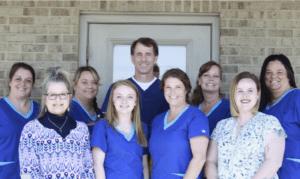
Accidents that cause facial trauma can be anything from a broken tooth that requires replacement, to a shattered jaw and orbital bone that require a facial trauma surgeon to perform multiple procedures over several months to properly correct. Most hospital ERs have a maxillofacial surgeon on-call for those serious emergencies that require immediate and complete attention.
Surgeons who specialize in facial trauma have a specific skill and knowledge base that allows them to understand how to piece back together the intricate structures that comprise the face, mouth and jaw. Maxillofacial surgeons have extra education and experience; training often requires a longer residency than other dental specialists and oral surgeons. Highly trained maxillofacial dental surgeons are basically a step up from a more generalized oral surgeon. They have the skillset and know-how to tackle basically any kind of complex case. But what specifically do they excel in?
Facial Trauma Surgeons Can Reconstruct Bone and Soft Tissue Injuries
When you’re in an accident that causes trauma to your face; it’s not just bones that might suffer, but soft tissue as well. Facial trauma surgeons have to be familiar with reconstructing both. Soft tissue injuries heal differently than bone injuries; and surgeons who specialize in facial trauma understand how to reconstruct both in tandem.
Soft tissue maxillofacial injuries that might require a facial trauma surgeon include deep lacerations that might affect how facial nerves, ligaments and muscles work. Maxillofacial reconstruction of soft tissue injuries aims to:
- make it look as if it never happened by minimizing long-term scarring and facial deformation
- restore a patient’s ability to move their face and mouth naturally
Maxillofacial Surgeons are Trained in Administering Dental Anesthesia
In highly complex cases that requires the skilled touch of a local maxillofacial surgeon, there’s likely going to be some form of anesthesia involved to make the process easier for both the patient and the surgeon. Maxillofacial dental doctors receive adequate anesthesia training in school and are certified to safely administer it to their patients.
Anesthesia administered by a maxillofacial surgeon is necessary to ensure patient comfort and minimize their anxiety surrounding the procedure. Maxillofacial surgeons who are adept at fixing facial trauma routinely administer the following kinds of anesthesia:
- Local anesthesia
- IV sedation
- General anesthesia
Providing anesthesia to patients is no short order either. It involves tons of training and studying to ensure patient safety during their surgery. Maxillofacial dental surgeons with plenty of education study multiple areas in school relating to anesthesia and its effects on the human body:
- Pharmacology – this involves a complete understanding of the medication used in anesthesia. Dosages, effects, and interactions with other pharmaceuticals are studied here.
- Physiology – this is all about how the human body responds to anesthesia. While studying this area, maxillofacial surgeons learn to monitor vital signs during sedation as well.
- Airway management – maintaining a patient’s airways during general anesthesia especially is crucial during surgery.
- Emergency protocols – your local maxillofacial dentist is trained to manage any number of potential complications during anesthesia that may arise.
Maxillofacial Surgeons Create Specialized Treatment Plans for Delicate Injuries
Injuries to facial bones that maxillofacial surgeons reconstruct include shattered jaws, cheekbones or orbital bones. Facial trauma surgeons piece broken bones back together much in the same way other surgeons treat bone trauma in the rest of the body. However, facial trauma surgery for bone injuries requires specialized skill, like:
- accessing damaged areas with minimal invasiveness so as not to affect the appearance of the face.
- understanding how and when a jaw need wired shut for optimal healing.
- applying the use of plates and screws to help keep broken facial bones in place as they heal.
- understanding the healing processes of parts of the face and treating different areas in tandem so they heal together.
- knowing how to replace teeth in a way that best restores the appearance and function of a smile.
Much of the expertise maxillofacial trauma surgeons require is based in patient skill and gentle care. The best surgeons in facial trauma also base their treatment theory in interdisciplinary care; meaning if a case requires other professionals like a plastic surgeon or ENT specialist, they know how to work as a team to best treat the patient.
A Maxillofacial Surgeon is Skilled in Cleft Lip and Palate Surgery
What a lot of people might not know about the maxillofacial surgeon down the road from them is that they can actually correct a number of congenital deformities. In addition to repairing facial trauma, a maxillofacial dental surgeon with years of experience is also going to be adept at treating cleft lip and palate.
These conditions occur when the lip or the roof of the mouth don’t fully close while a child is still in the womb. Once born, these deformities can present a number of problems. Children with cleft lip or palate might experience:
- Difficulty eating
- Speech impediments
- Ostracization from other children due to their facial deformities
Maxillofacial surgeons possess the necessary skillset to address these complex issues. A maxillofacial dentist with extensive training can perform the following surgeries to fix facial deformities:
- Cheiloplasty – this surgery focuses on repairing and closing the gap in the lip on patients. This creates a much more natural appearance around the mouth and drastically improves the function of the lip muscles.
- Palatoplasty – as the name suggests, this surgery is all about closing the hole in the palate, or the roof of the mouth. While not focused on aesthetics like a cheiloplasty, this surgery helps with speech development and allows for the correct production of sounds.
Full Mouth Reconstructions are Best Accomplished by Facial Trauma Surgeons
Because oral surgeons who deal with facial trauma perform reconstructive procedures, these are the best dentists for patients who need full mouth reconstruction. Full mouth reconstruction might include dental bone grafting, soft tissue grafting, tooth replacement with dental implants, and more.
Oral surgeons who perform full mouth reconstructions, whether caused by trauma, illness or decay, are best suited to take an unhealthy or injured mouth and heal it from the inside out, restoring long-term health of the patient’s mouth and jaw.
The right maxillofacial surgeon will be able to correct facial trauma caused by disease or injury in a way that reconstructs original structures, whether it be through grafts, plates or dental implants. Even patients with extensive damage may be able to receive dental implant surgery, for instance, if the facial surgeon can find a way to restore the jaw bone.
Facial Trauma Surgeons Can Even Assist with TMJ Disorders
Did you know that in addition to repairing facial trauma, a maxillofacial surgeon can also help treat temporomandibular joint disorders (TMJ)? TMJ is a fairly common source of facial pain and dysfunction for many people. The joint in question is the one that connects your jawbone to your skull. When this joint experiences problems, it leads to a range of uncomfortable symptoms. Since maxillofacial dentists are sort of jawbone experts, they’re highly skilled in treating this condition.
The following conditions can contribute to TMJ:
- Trauma
- Bruxism
- Teeth misalignment
- Arthritis
- Stress
A maxillofacial surgeon with experience treating TMJ disorders might take a more conservative approach initially before considering surgery. This includes treatment like custom-crafted night guards for teeth grinding, physical therapy, stress management techniques, or even steroid injections in the affected area.
If none of the conservative treatments are working, facial trauma surgeons might recommend the following surgical interventions:
- Arthrocentesis – This surgery is minimally invasive and aims to flush the joint space, removing byproducts that contribute to inflammation.
- Open joint surgery – Usually reserved for complex cases of TMJ.
Oral and Maxillofacial Surgical Services for Cincinnati Patients
Dr. Puckett is a full mouth reconstruction dentist specializing in oral and maxillofacial surgery. He is on-call at Clinton Memorial Hospital for his expertise at diagnosing, creating treatment plans, and surgically repairing facial trauma, whether it’s a broken tooth or a full mouth reconstruction. His skills also include pediatric maxillofacial medicine, because children with facial trauma have different needs than adults.
With a confident and gentle hand, Dr. Puckett provides his Cincinnati patients with the utmost care and detailed attention. Facial trauma is best treated as soon as possible after the incident, so consider a consult with our maxillofacial trauma surgeon – you’re in good hands.







